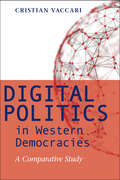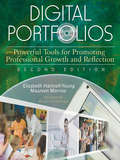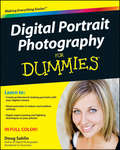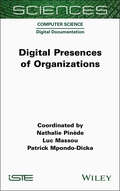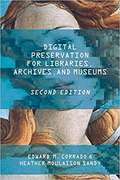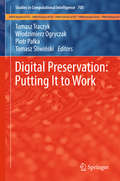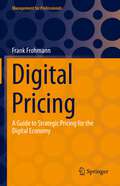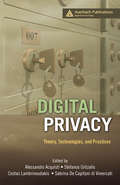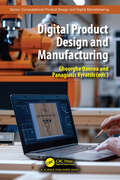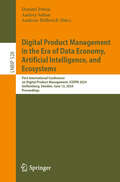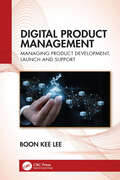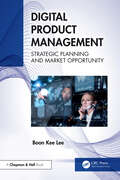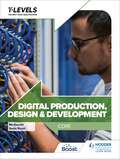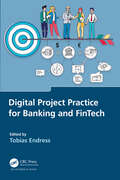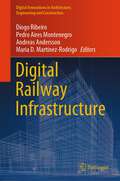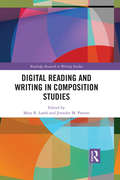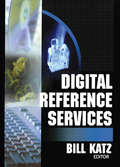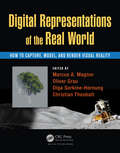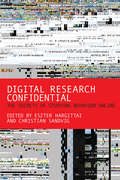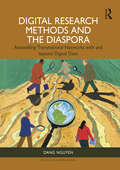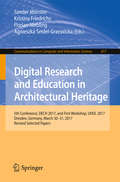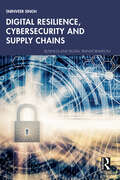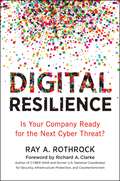- Table View
- List View
Digital Politics in Western Democracies: A Comparative Study
by Cristian VaccariA comparative analysis of political websites and their users from seven Western democracies.Digital politics is shorthand for how internet technologies have fueled the complex interactions between political actors and their constituents. Cristian Vaccari analyzes the presentation and consumption of online politics in seven advanced Western democracies—Australia, France, Germany, Italy, Spain, the United Kingdom, and the United States—from 2006 to 2010. His study not only refutes claims that the web creates homogenized American-style politics and political interaction but also empirically reveals how a nation’s unique constraints and opportunities create digital responses. Digital Politics in Western Democracies is the first large-scale comparative treatment of both the supply and the demand sides of digital politics among different countries and national political actors. It is divided into four parts: theoretical challenges and research methodology; how parties and candidates structure their websites (supply); how citizens use the websites to access campaign information (demand); and how the research results tie back to inequalities, engagement, and competition in digital politics. Because a key aspect of any political system is how its actors and citizens communicate, this book will be invaluable for scholars, students, and practitioners interested in political communication, party competition, party organization, and the study of the contemporary media landscape writ large.
Digital Portfolios: Powerful Tools for Promoting Professional Growth and Reflection (2nd Edition)
by Elizabeth Hartnell-Young Maureen P. MorrissProviding ten steps to develop portfolios that demonstrate professional growth, this complete resource presents tips and strategies for using digital technology and guidelines for creating portfolios.
Digital Portrait Photography For Dummies
by Doug SahlinA full-color guide to the art of digital portrait photographyPortrait photography entails taking posed photographs of individuals or set scenery and is the most common photo style among the most novice photography hobbyist to the most advanced photographer. With this easy-to-understand guide, bestselling author and professional photographer Doug Sahlin walks you through the best techniques for getting professional-quality digital portraits.Packed with hundreds of full-color photos and screen shots, this book discusses best practices for taking formal portraits, wedding photos, event photos, casual photos, and more. You'll examine the difference between using the built-in flash and natural lighting and take a look at the benefits of upgrading to a photo lighting kit and pro backdrop. Portrait photography is the most popular style of photography Features helpful information for everyone from beginner hobbyists to advanced photographers Shares insider tips for selecting equipment and choosing from the various tools for portrait photographyWalks you through working with a wide range of subjects, including children, pets, and wildlifeDiscusses lighting and editing imagesTakes a look at ways to create a portrait that is suitable for framingMake sure your subjects are ready for their close ups with this fun and friendly guide to digital portrait photography.
Digital Portrait Photography of Teens and Seniors
by Patrick RiceDivided into two parts, this guide shows studio owners and photographers how to increase visibility, creativity, and financial rewards in the teen and senior portrait market. The first section is focused on technical mastery, gives tips on how to refine one's technique and remain competitive and providing advice on selecting the appropriate digital equipment and added artistic elements like indoor and outdoor sets, storytelling props, and fashionable backgrounds. The second section is devoted to successful marketing techniques that are low-cost and have a big impact, such as maintaining an Internet presence, offering special promotions, and producing direct-mail marketing pieces. Numerous marketing pieces from top studios are included as reference points.
Digital Presences of Organizations (ISTE Invoiced)
by Luc Massou Patrick Mpondo-Dicka Nathalie PinèdeDigital Preservation For Libraries, Archives, And Museums
by Edward M. Corrado Heather Moulaison SandyThis new edition of Digital Preservation in Libraries, Archives, and Museums is the most current, complete guide to digital preservation available today. <p><p> For administrators and practitioners alike, the information in this book is presented readably, focusing on management issues and best practices. Although this book addresses technology, it is not solely focused on technology. After all, technology changes and digital preservation is aimed for the long term. This is not a how-to book giving step-by-step processes for certain materials in a given kind of system. Instead, it addresses a broad group of resources that could be housed in any number of digital preservation systems. Finally, this book is about “things (not technology; not how-to; not theory) I wish I knew before I got started.” <p> Digital preservation is concerned with the life cycle of the digital object in a robust and all-inclusive way. Many Europeans and some North Americans may refer to digital curation to mean the same thing, taking digital preservation to be the very limited steps and processes needed to insure access over the long term. The authors take digital preservation in the broadest sense of the term: looking at all aspects of curating and preserving digital content for long term access.
Digital Preservation: Putting It to Work
by Włodzimierz Ogryczak Tomasz Traczyk Piotr Pałka Tomasz ŚliwińskiThis book addresses the process of maintaining digital objects through time to ensure continued access, an aspect that has become a crucial issue in recent years. It offers a concise yet comprehensive discussion of key concepts and requirements for long-term digital preservation, and presents a pioneering framework for digital repositories that enables the long-term archiving and metadata management for large volumes of digital resources based on a system that has already been completely designed and launched. In the framework, the reliability of information readouts is ensured by the repository with two-level data recording replication and monitoring mechanisms in the repository management system (RMS) and the file systems, and by the RMS's distributed nature. The advanced RMS allows operations on the archival storage to be scheduled, while also taking into account low energy consumption requirements. After presenting the framework in detail, the book assesses and demonstrates the approach's viability in terms of delivering accessibility, authenticity and usability. As such, the book offers a valuable resource for information technology (IT) researchers and practitioners, as well as archivists and librarians.
Digital Pricing: A Guide to Strategic Pricing for the Digital Economy (Management for Professionals)
by Frank FrohmannThis is one of the first books to combine the current megatrend of digitalization and pricing as the most effective lever for increasing and sustaining profits. The book presents the basics of digital pricing as well as modeling methods and implementation examples. This structure helps in tackling the latest developments and challenges due to digitalization. Readers will gain a detailed insight into using innovative revenue and price models to generate a sustainable competitive advantage for their companies. The author uses his cross-industry experience to draw on several examples of innovative digital pricing approaches which can be applied in industrial sectors such as automotive, industrial goods and machinery, as well as service sectors like telecommunications, transportation and tourism.
Digital Privacy: Theory, Technologies, and Practices
by Sabrina De Capitani di Vimercati Alessandro Acquisti Stefanos Gritzalis Costas LambrinoudakisDuring recent years, a continuously increasing amount of personal data has been made available through different websites around the world. Although the availability of personal information has created several advantages, it can be easily misused and may lead to violations of privacy. With growing interest in this area, Digital Privacy: Theory, Technologies, and Practices addresses this timely issue, providing information on state-of-the-art technologies, best practices, and research results, as well as legal, regulatory, and ethical issues. This book features contributions from experts in academia, industry, and government.
Digital Product Design and Manufacturing (Computational Product Design and Digital Manufacturing)
by Panagiotis Kyratsis Gheorghe OanceaDigitalization concepts and methods have, in recent times, drawn the interest of researchers and academics, especially in design and manufacturing. Modern product design integrates advanced CAD/CAE/CAPP/CAM/PLM and computational tools as a means to automate tasks and increase the quality of the designed product, while reducing manufacturing cost and the time-to-market. The same is true that in the era of artificial intelligence, digital manufacturing is a fast-expanding focus of research that includes not only pure manufacturing topics but also additive manufacturing, reverse engineering, simulations of material properties for strength, manufacturability, and optimization of manufacturing processes.The book aims to cover digital tools and methods that offer additional advantages for designing and manufacturing products in a variety of industries. Furthermore, the book reviews green digital design and green digital manufacturing in the context of a circular economy.
Digital Product Management in the Era of Data Economy, Artificial Intelligence, and Ecosystems: First International Conference on Digital Product Management, ICDPM 2024, Gothenburg, Sweden, June 12, 2024, Proceedings (Lecture Notes in Business Information Processing #528)
by Andreas Helferich Dimitri Petrik Andrey SaltanThis book constitutes the proceedings of the First International Conference on Digital Product Management, ICDPM 2024, which took place in Gothenburg, Sweden, on June 12, 2024. This year’s theme was “Digital Product Management in the Era of Data Economy, Artificial Intelligence, and Ecosystems”. The 6 full papers and 1 short paper included in these proceedings were carefully reviewed and selected from 19 submissions. They deal with data-driven startups and the agility required in processes and strategies for data-centric business models that differ from traditional software business models.
Digital Product Management: Managing Product Development, Launch and Support
by Boon Kee LeeFocusing on operational excellence, this book will take readers through the practicalities of product development, market launch, and ongoing product support. Building on the strategic foundation from Volume 1, Digital Product Management: Strategic Planning and Market Opportunity, this volume emphasizes executing product strategies in real-world contexts.The book covers key methodologies such as agile development, product lifecycle management, and data-driven decision-making. Topics include marketing strategies, sales channel management, customer engagement, and optimizing digital experiences. It also delves into product analytics, customer retention, and feature adoption. With chapters on building a product operating model and scaling product operations, the volume emphasizes how organizations can drive continuous improvement and ensure alignment across teams. Ethical leadership and continuous innovation are also explored, highlighting the critical role of ethics in digital product management.This book is an essential resource for product managers looking to refine their skills in execution, cross-functional collaboration, and operational growth as well as for professionals aiming to combine strategy with practical delivery. It is particularly useful for those responsible for managing the development, launch, and support of digital products, ensuring products not only meet market needs but also evolve with customer expectations.
Digital Product Management: Strategic Planning and Market Opportunity
by Boon Kee LeeThis book is designed to equip readers with essential knowledge and skills in digital product management. It covers strategic planning and market opportunity, offering a clear and accessible guide to navigating the complex world of digital product management in today's fast-changing environment.Chapters explore key topics, including understanding digital transformation, identifying market dynamics, and developing a comprehensive product strategy. Readers will learn how to conduct market research, build strong business cases, and define product positioning. The book also covers practical methods for selecting pricing and packaging strategies, as well as crafting a go-to-market plan. Real-world examples, such as the growth of Grab in Southeast Asia, the rise of Zoom during the global pandemic, and Shopify's role in empowering small businesses globally, provide insight into how companies leverage strategic planning and market insights to thrive. The content reflects both current and future trends, making it relevant for global markets and today’s digitally-driven economy.This book is especially useful for product managers, entrepreneurs, and business leaders who are keen to refine their strategic planning skills. It offers actionable advice and frameworks that can be applied across various industries, empowering readers to successfully manage digital products and drive business growth.
Digital Production, Design and Development T Level: Core
by Sonia Stuart Maureen EverettTackle the core component of the Digital Production, Design and Development T Level with this comprehensive resource.Written by highly respected authors, Mo Everett and Sonia Stuart, this clear, accessible and thorough textbook will guide learners through the key principles, concepts and terminology, as well as providing the inside track into what it takes to kick-start a career in the Digital world.- Simplify complex topics with summary tables, diagrams, key term definitions and a glossary.- Track and strengthen knowledge by using learning outcomes at the beginning of every unit and 'Test Yourself' questions.- Apply knowledge and understanding across 100s of engaging activities and research tasks.- Prepare for exams and the employer-set project using practice questions and project practice exercises.- Get ready for the workplace with industry tips and real-world examples.- Be guided through the course by expert authors Mo Everett and Sonia Stuart, who draw on their extensive industry and teaching experience.
Digital Production, Design and Development T Level: Core
by Sonia Stuart Maureen EverettTackle the core component of the Digital Production, Design and Development T Level with this comprehensive resource.Written by highly respected authors, Mo Everett and Sonia Stuart, this clear, accessible and thorough textbook will guide learners through the key principles, concepts and terminology, as well as providing the inside track into what it takes to kick-start a career in the Digital world.- Simplify complex topics with summary tables, diagrams, key term definitions and a glossary.- Track and strengthen knowledge by using learning outcomes at the beginning of every unit and 'Test Yourself' questions.- Apply knowledge and understanding across 100s of engaging activities and research tasks.- Prepare for exams and the employer-set project using practice questions and project practice exercises.- Get ready for the workplace with industry tips and real-world examples.- Be guided through the course by expert authors Mo Everett and Sonia Stuart, who draw on their extensive industry and teaching experience.
Digital Project Practice for Banking and FinTech
by Tobias EndressNew technology and changes in the regulatory framework have had a significant impact; various new players have emerged, and new business models have evolved. API-based ecosystems have become the new normal and collaboration in the financial and banking industry has reached new levels. Digital Project Practice for Banking and FinTech focuses on technology changes in the financial industry and their implications for business practice.A combination of practical experience in the field as well as academic research, the book explores a wide range of topics in the multifaceted landscape of FinTech. It examines the industry’s various dimensions, implications, and potential based on academic research and practice. From project management in the digital era to the regulation and supervision of FinTech companies, the book delves into distinct aspects of this dynamic field, offering valuable insights and practical knowledge. It provides an in-depth overview of various unfolding developments and how to deal with and benefit from them.The book begins by exploring the unique challenges and opportunities project management presents in the digital era. It examines the evolving role of project management and provides strategies for effectively navigating the complexities of digital transformation initiatives. The book then covers such topics as: Financial Technology Canvas, a powerful tool for facilitating effective communication within fintech teams Process automation implementation in the financial sector and related benefits, challenges, and best practices to drive operational efficiency and enhance customer experiences Robotic process automation in financial institutions Cyptoeconomics and its potential implications for the diffusion of payment technologies The efficiency and risk factors associated with digital disruption in the banking sector. At its core, this book is about real-world practice in the digital banking industry. It is a source of different perspectives and diverse experiences from the global financial and banking industry..
Digital Railway Infrastructure (Digital Innovations in Architecture, Engineering and Construction)
by Diogo Ribeiro Pedro Aires Montenegro Andreas Andersson Maria D. Martínez-RodrigoThis book describes the most recent strategies for the digitalization of railway sector that bring new challenges for the construction, operation, and maintenance of railway infrastructures. These strategies involve the development and application of new technologies and methodologies to enhance the sustainability and resilience of railway infrastructures particularly under extreme climate and operational events. In particular, the digital transformation involves the use of digital twins, augmented and virtual reality, forecast capabilities, risk and life-cycle analysis, cybersecurity, unmanned technologies for monitoring and inspection, computer vision, AI, risk and disaster management, among others. Presently, the literature is lacking a contribution that provides general and foundational knowledge across these and other topics. Therefore, this book provides valuable information for researchers, students, and professionals in railway engineering that want to develop their knowledge and skills in this field.
Digital Reading and Writing in Composition Studies (Routledge Research in Writing Studies)
by Mary R. Lamb Jennifer M. ParrottAs digital reading has become more productive and active, the lines between reading and writing become more blurred. This book offers both an exploration of collaborative reading and pedagogical strategies for teaching reading and writing that reflect the realities of digital literacies. This edited scholarly collection offers strategies for teaching reading and writing that highlight the possibilities, opportunities, and complexities of digital literacies. Part 1 explores reading and writing that happen digitally and offers frameworks for thinking about this process. Part 2 focuses on strategies for the classroom by applying reading theories, design principles, and rhetorical concepts to instruction. Part 3 introduces various disciplinary implications for this blended approach to writing instruction. What is emerging is new theories and practices of reading in both print and digital spaces—theories that account for how diverse student readers encounter and engage digital texts. This collection contributes to this work by offering strategies for sustaining reading and cultivating writing in this landscape of changing digital literacies. The book is essential for the professional development of beginning teachers, who will appreciate the historical and bibliographic overview as well as classroom strategies, and for busy veteran teachers, who will gain updated knowledge and a renewed commitment to teaching an array of literacy skills. It will be ideal for graduate seminars in composition theory and pedagogy, both undergraduate and graduate; and teacher education courses, and will be key reading for scholars in rhetoric and composition interested in composition history, assessment, communication studies, and literature pedagogy.
Digital Reference Services
by Linda S KatzExtensive data on the theoretical and practical aspects of electronic reference services! Digital Reference Services provides an overview of electronic reference services and software, and explores the opportunities that real-time digital reference services can offer in a variety of library settings. Experts in the field convey numerous opinions and theory about the growth of this new approach to answering reference questions. This book teaches librarians new methods and techniques for offering technologically advanced reference services to the public. The first half of Digital Reference Services includes such topics as: real-time or "live online" reference services the historical development of digital reference services and the role of the reference librarian mediated online searches how to create a virtual-ready reference collection of elite reference Web sites-includes a list of the top sites available to the public how to start and operate a digital reference desk in your library The second half of Digital Reference Services covers examples of libraries-both large and small-which have used revolutionary ideas to bring electronic reference services to their patrons. These ideas include: utilizing ATM-like kiosks in remote locations from library buildings to connect with underserved populations implementing live, interactive web-based reference services-the challenges and benefits, cost, training, and workload requirements evaluating your real-time references services-investigating self-assessment and blind reviewing, incorporating your assessment into an existing evaluative program, and obtaining the administrative support essential for an accurate assessment creating a statewide virtual reference system-selecting software, developing policy, marketing, coordinating the project, and staffing and training online reference management for smaller libraries-because of the smaller staff, smaller budget, and smaller amount of patrons, is it a feasible addition to the library? much more! This well-referenced volume contains case examples, figures, useful Web sites, and case histories to show how the basic principles of digital reference services work. Librarians and students of information and library science will find Digital Reference Services a helpful resource to enhance their library and electronic reference expertise.
Digital Representations of the Real World: How to Capture, Model, and Render Visual Reality
by Olga Sorkine-Hornung Oliver Grau Christian Theobalt Marcus A. Magnor Oliver GrauCreate Genuine Visual Realism in Computer Graphics Digital Representations of the Real World: How to Capture, Model, and Render Visual Reality explains how to portray visual worlds with a high degree of realism using the latest video acquisition technology, computer graphics methods, and computer vision algorithms. It explores the integration of ne
Digital Research Confidential: The Secrets of Studying Behavior Online
by Hargittai Eszter Christian SandvigBehind-the-scenes stories of how Internet research projects actually get done.The realm of the digital offers both new methods of research and new objects of study. Because the digital environment for scholarship is constantly evolving, researchers must sometimes improvise, change their plans, and adapt. These details are often left out of research write-ups, leaving newcomers to the field frustrated when their approaches do not work as expected. Digital Research Confidential offers scholars a chance to learn from their fellow researchers' mistakes—and their successes. The book—a follow-up to Eszter Hargittai's widely read Research Confidential—presents behind-the-scenes, nuts-and-bolts stories of digital research projects, written by established and rising scholars. They discuss such challenges as archiving, Web crawling, crowdsourcing, and confidentiality. They do not shrink from specifics, describing such research hiccups as an ethnographic interview so emotionally draining that afterward the researcher retreated to a bathroom to cry, and the seemingly simple research question about Wikipedia that mushroomed into years of work on millions of data points. Digital Research Confidential will be an essential resource for scholars in every field.ContributorsMegan Sapnar Ankerson, danah boyd, Amy Bruckman, Casey Fiesler, Brooke Foucault Welles, Darren Gergle, Eric Gilbert, Eszter Hargittai, Brent Hecht, Aron Hsiao, Karrie Karahalios, Paul Leonardi, Kurt Luther, Virág Molnár, Christian Sandvig, Aaron Shaw, Michelle Shumate, Matthew Weber
Digital Research Methods and the Diaspora: Assembling Transnational Networks with and Beyond Digital Data
by Dang NguyenThe computational turn in the social sciences and humanities has generated much excitement about the potential to refresh our approaches to the study of the techno-social. From natively digital to digitised data, researchers of digital diasporas increasingly find themselves working with a range of disparate digital objects. These digital objects can include anything from hyperlink to timestamps, from platform behavioural metrics such as react, share, or retweet to different media formats such as text, image, pre-recorded or livestreamed videos. Taking these disparate objects into account, this book introduces digital methods as research strategies not only for dealing with the ephemeral and unstable nature of tracing the diaspora with digital data, but also for reconceptualizing digital diasporas as assemblages and networks of more-than-human actors. The book also introduces a range of theoretical perspectives and methodological techniques to studying digital diasporas as contingent and processual hybrid collectives of heterogeneous material, cultural, and practice-based assemblages. This book will be essential reading for students and scholars interested in the digital space and transnational communities.
Digital Research and Education in Architectural Heritage: 5th Conference, Dech 2017, And First Workshop, Uhdl 2017, Dresden, Germany, March 30-31, 2017, Revised Selected Papers (Communications In Computer And Information Science #817)
by Sander Münster Kristina Friedrichs Florian Niebling Agnieszka Seidel-GrzesińskaThis book constitutes the refereed proceedings of the 5th Conference on Digital Encounters with Cultural Heritage, DECH 2017, and the First Workshop on Research and Education in Urban History in the Age of Digital Libraries, UHDL 2017, held in Dresden, Germany, in March 2017.The 11 revised full papers from DECH 2017 and two revised full papers from UHDL 2017 presented in this volume were carefully reviewed and selected from 33 joint submissions. The papers are organized in topical sections on research on architectural and urban cultural heritage; technical access; systematization; education in urban history; organizational perspectives.
Digital Resilience, Cybersecurity and Supply Chains (Business and Digital Transformation)
by Tarnveer SinghIn the digital era, the pace of technological advancement is unprecedented, and the interconnectivity of systems and processes has reached unprecedented levels. While this interconnectivity has brought about numerous benefits, it has also introduced new risks and vulnerabilities that can potentially disrupt operations, compromise data integrity, and threaten business continuity. In today's rapidly evolving digital landscape, organisations must prioritise resilience to thrive. Digital resilience encompasses the ability to adapt, recover, and maintain operations in the face of cyber threats, operational disruptions, and supply chain challenges. As we navigate the complexities of the digital age, cultivating resilience is paramount to safeguarding our digital assets, ensuring business continuity, and fostering long-term success. Digital Resilience, Cybersecurity and Supply Chains considers the intricacies of digital resilience, its various facets, including cyber resilience, operational resilience, and supply chain resilience. Executives and business students need to understand the key challenges organisations face in building resilience and provide actionable strategies, tools, and technologies to enhance our digital resilience capabilities. This book examines real-world case studies of organisations that have successfully navigated the complexities of the digital age, providing inspiration for readers’ own resilience journeys.
Digital Resilience: Is Your Company Ready for the Next Cyber Threat?
by Ray RothrockIn the Digital Age of the twenty-first century, the question is not if you will be targeted, but when. Are you prepared? If not, where does one begin? For an enterprise to be fully prepared for the immanent attack, it must be actively monitoring networks, taking proactive steps to understand and contain attacks, enabling continued operation during an incident, and have a full recovery plan already in place.Cybersecurity expert Ray Rothrock has provided for businesses large and small a must-have resource that highlights:the tactics used by today&’s hackers,vulnerabilities lurking in networks,and strategies not just for surviving attacks, but thriving while under assault.Businesses and individuals will understand better the threats they face, be able to identify and address weaknesses, and respond to exploits swiftly and effectively. From data theft to downed servers, from malware to human error, cyber events can be triggered anytime from anywhere around the globe.Digital Resilience provides the resilience-building strategies your business needs to prevail--no matter what strikes.
